

Those Magical and Mysterious Learning Moments. September 3, 2014 By: Maryellen Weimer, PhD in Teaching Professor Blog I’ve been reading some old issues of The Teaching Professor newsletter and ran across a lovely piece by William Reinsmith on learning moments.
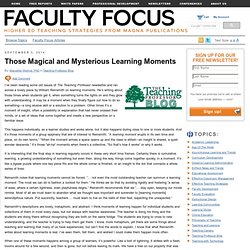
He’s writing about those times when students get it, when something turns the lights on and they glow with understanding. It may be a moment when they finally figure out how to do so something—a long elusive skill or a solution to a problem. Other times it’s a moment of insight, often a possibility or explanation that had never crossed their minds, or a set of ideas that come together and create a new perspective on a familiar issue.
This happens individually, as a learner studies and works alone, but it also happens during class to one or more students. It is interesting that the final step in learning regularly occurs in these very short time frames. Flipped learning skepticism: Is flipped learning just self-teaching? - Casting Out Nines. I had to take a bit of a hiatus for the last two weeks to finish up the semester and to give and grade exams.
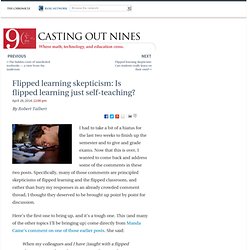
Now that this is over, I wanted to come back and address some of the comments in these two posts. Specifically, many of those comments are principled skepticisms of flipped learning and the flipped classroom, and rather than bury my responses in an already crowded comment thread, I thought they deserved to be brought up point by point for discussion. Here’s the first one to bring up, and it’s a tough one. This (and many of the other topics I’ll be bringing up) come directly from Manda Caine’s comment on one of those earlier posts. She said: Microflipping: a Modest Twist on the 'Flipped' Classroom - The Digital Campus 2014. Flipped-ClassrooomV4-final. Meet Generation NeXt. 21st Century Learning working definition. How to Make the Most of the Flipped Classroom. Teaching and Learning | Feature How to Make the Most of the Flipped Classroom Last semester, the Vanderbilt University (TN) Center for Teaching's two most popular workshops were "Flipping the Classroom" and "Leading Classroom Discussion.
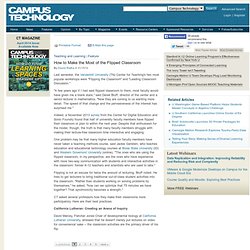
" "A few years ago if I had said flipped classroom to them, most faculty would have given me a blank stare," said Derek Bruff, director of the center and a senior lecturer in mathematics. "Now they are coming to us wanting more detail. The speed of that change and the pervasiveness of the interest has surprised me. " Indeed, a November 2013 survey from the Center for Digital Education and Sonic Foundry found that half of university faculty members have flipped their classroom or plan to within the next year. Flipping is not an excuse for twice the amount of lecturing, Bruff noted. CT asked several professors how they make their classrooms more participatory.
California Lutheran: Creating an Arena of Inquiry. What 21st Century Learning Means To Me. The word ‘evolve’ means to come forth gradually into being; develop.
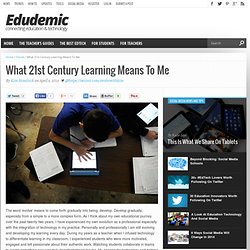
Develop gradually, especially from a simple to a more complex form. As I think about my own educational journey over the past twenty-two years, I have experienced my own evolution as a professional especially with the integration of technology in my practice. Personally and professionally I am still evolving and developing my learning every day. During my years as a teacher when I infused technology to differentiate learning in my classroom, I experienced students who were more motivated, engaged and felt passionate about their authentic work. Watching students collaborate in teams to create something new was truly transformational for me.
Living in a Digital World We Don’t Understand. Teaching 21st-century skills for 21st-century jobs GUEST COLUMN | by Cat McManus The term “21st century skills” gets thrown around a lot in educational circles. Some use this term to mean “computer literacy.” Others expand the concept to include a “range of skills and competencies that go beyond what has traditionally been taught in the classroom, [including] critical thinking and problem solving; communication, collaboration; and creativity and innovation.”
Still others—most significantly the advocacy organization Partnership for 21st Century Skills—include “information literacy, media literacy, and information, communication and technology literacy.” RSA Animate - Changing Education Paradigms. Ethiopian kids hack OLPCs in 5 months with zero instruction. What happens if you give a thousand Motorola Zoom tablet PCs to Ethiopian kids who have never even seen a printed word?
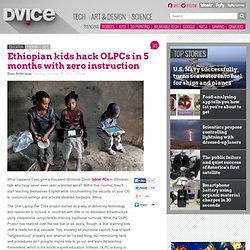
Within five months, they'll start teaching themselves English while circumventing the security on your OS to customize settings and activate disabled hardware. Whoa. The One Laptop Per Child project started as a way of delivering technology and resources to schools in countries with little or no education infrastructure, using inexpensive computers to improve traditional curricula. What the OLPC Project has realized over the last five or six years, though, is that teaching kids stuff is really not that valuable. Technology innovation should focus on letting teachers teach (essay) Virtually everywhere you turn, somebody is promoting the idea that technology is a – if not the -- solution to educational completion.
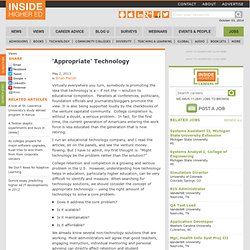
Panelists at conferences, politicians, foundation officials and journalists/bloggers promote the view. It is also being supported loudly by the checkbooks of the venture capitalist community. College completion is, without a doubt, a serious problem. In fact, for the first time, the current generation of Americans entering the work force is less educated than the generation that is now retiring. We Need to Disrupt Education, Now. The 21st Century Learning and Teaching Skills You should not Miss. Digital media and internet are transforming the way our kids socialize and play; they are even changing the way they learn and participate civically.
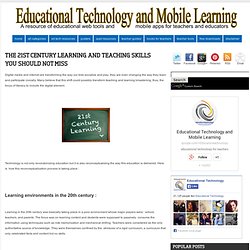
Many believe that this shift could possibly transform teaching and learning broadening, thus, the focus of literacy to include the digital element. Technology is not only revolutionizing education but it is also reconceptualizing the way this education is delivered. Here is how this reconceptualization process is taking place : Learning environments in the 20th century : Learning in the 20th century was basically taking place in a poor environment whose major players were : school, teachers, and parents.